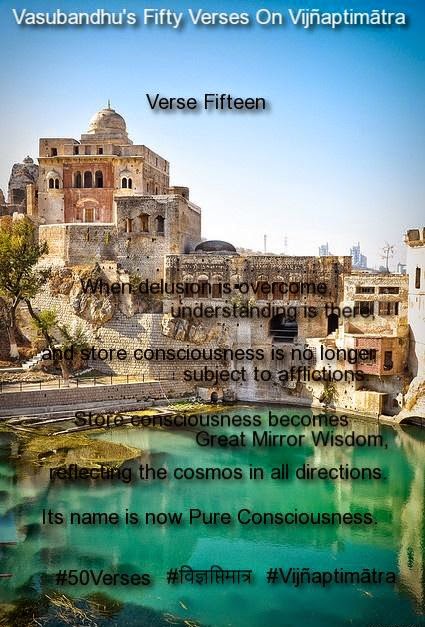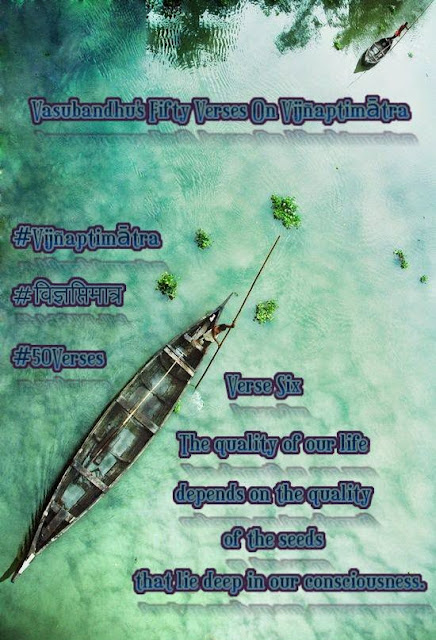Some seeds are innate,
handed down by our ancestors.
Some were sown while we were still in the womb,
others were sown when we were children.
Many characteristics are passed on from parents to children like physical features, habits etc. We receive seeds from our ancestors in our store consciousness. These will manifest when the conditions are right. We pass on these seeds to our children.
Some seeds that we have inherited from our ancestors may not manifest in this generation but may manifest in future generations. When we look into the history books we can see that some kings of a particular dynasty displayed better administrative acumen than other kings of the same dynasty.
Even when we are in the womb, our mind receives impressions. When the mother suffers, so does the child. If the mother practices the five mindfulness trainings, it will have a great impact on the baby.
When we are children, it is very important that we nourish the seeds of enlightenment within us by practicing the five mindfulness trainings. Instead, we end up doing just the opposite.
In India, parents tend to appreciate academic performance more than necessary. They somehow link knowledge and abilities with grades and marks obtained in exams. This can lead to many negative habits like children eager to copy in exams, learning to make excuses etc. Not getting an A in Economics will likely not have much impact in our development as a Bodhisattva but learning to copy, to cheat, to lie, sets us back. Children learn to lie when they realize that they might be scolded or subject to physical punishment.
With great proficiency in cheating and lying we may become good businessmen but that will not free us from the sufferings of birth and separation, suffering of not having what we want and suffering of having what we do not want.
If we teach our children the five mindfulness trainings, they will have a greater chance of finding peace and joy. We need to be skilled as parents to explain things. A child may tear a butterfly's wings. We must explain to them that if we tear a butterfly's wings then she will not be able to go back home to her parents. The child will understand that it is not a good thing to do. If we educate our children on mindful consumption then they will not eat non-vegetarian food, they will not smoke and drink. By teaching them pebble meditations, we can help them deal with challenges.
We have the practice of pebble meditation to cultivate the four qualities of happiness. The first is freshness – fresh as a flower. The second is stability – solid as a mountain. The third is peace/tranquility – still water. And the fourth is freedom – space.
We have great impact on children and we shape our future generations. By being mindful we can help them and we can also connect with our ancestors.
The Vijñaptimātra teachings don't just lead us to enlightenment but also help us become better parents, teachers, students, friends, citizens etc. while we progress on the path. Enlightenment is not separate from our daily life. Vijñaptimātra teachings do not ask us to leave our families but in fact bring us closer to our families and ancestors.
Pebble Meditation-From A Pebble for Your Pocket by Thich Nhat Hanh
1) One Pebble
A Pebble for Your Pocket
Sometimes when we become angry during the day, it is difficult to remember to stop and breathe. I know a good way for you to remember to stop and breathe when you are angry or upset. First go for a walk and find a pebble that you like. Then, go sit near the Buddha, if there is one in your house, or outside under a special tree or on a special rock, or go to your room. With the pebble in your hand, say:
Dear Buddha,
Here is my pebble. I am going to practice with it when things go wrong in my day. Whenever I am angry or upset, I will take the pebble in my hand and breathe deeply. I will do this until I calm down.
Now put your pebble in your pocket and take it with you wherever you go. When something happens during the day that makes you unhappy, put your hand in your pocket, take hold of the pebble, breathe deeply, and say to yourself, “Breathing in, I know I am angry. Breathing out, I am taking good care of my anger.” Do this until you feel a lot better and can smile to your anger.
2) Four Pebbles
Place the four pebbles in front of you…
Pick up the first
I am fresh as a flower,
In, fresh,
Out flower (bell)
Put down the first, pick up the second
I am solid as a mountain
In solid, out mountain (bell)
Put down second, pick up the third
I am water reflecting
In water, out reflecting (bell)
I am free as the moon in space
In free, out space
3) Five Pebbles (excerpt from a dharma talk by Thay)
After you are sitting in the stable, beautiful position, then take out your little bag of five pebbles. It is very important to do it slowly, mindfully. You take each pebble one by one, just in front of your left knee. One, two, three, four, five. And you put the little empty bag next to them.
After you hear the sound of the bell, you begin to practice pebble meditation. It’s very beautiful practice. I love this practice. I breathe in, and I call the name of the person I love. If your mother is a person you love,
When you breathe in, you breathe deeply and call “Mommy!” Call her name in such a way that she becomes totally present, even if she is not there with you, even if she is in the kitchen, or in another city, or another town,
Or even if she is no longer there alive. She is with you in that moment. Call her name, deeply, with all your heart, and breathe in, and she is there with you, right away, very real, very deep. And when you breathe out, you say, “Here I am.”
So during that practice of breathing in and breathing out, you and your mother are fully present. This is a very deep practice. It is not only for children. I practice it every day. I enjoy it very much, and I have more than five people I love the most. I am free to choose—this morning I will choose five people, and next morning I will choose another five people. That can bring you a lot of happiness. Suppose you hold the name of someone who is very real, very fresh, very loving, very kind, and if you call his name, or her name, deeply. That person will be with you right in the moment and you can see that your body and your mind are refreshed by the presence of that person.
It is a very deep practice. Because meditation is to be there, to be present, and this we learn always. No matter how long you have practiced Buddhist meditation, you have to learn it again and again. To meditate means to be there, to be there with one hundred percent of yourself. Because the more I am present, the happier I become, the more solid I become. This is only for my happiness, my stability; not for someone else’s.
You call the name of your mother five times, breathing in, and you say five times, breathing out, “here I am.” And after you finished five breathing in, breathing out, calling the name of your mother, and then you use your two fingers, you pick up one pebble, and you move it to your right. And then you sit upright again,
And you begin to breathe in again. and call the name of the second person. Suppose you love David. David is very sweet to you. David is a person who tends to be wonderful, compassionate, helpful. So you breathe in and you call “David!” And when he is fully present, you just break out and smile, and you say, “Here I am.” It is very wonderful. I think even during the first hour of practice, the first time you practice. You find joy and happiness already. I believe it.
(Based on the teachings of Thich Nhat Hanh.)
#विज्ञप्तिमात्र #Vijñaptimātra #VijñaptimatraBuddhism #ThichNhatHanh #Vasubandhu #50Verses #50VersesOnVijñaptimātra #Vimshatika #Trimshika #VimshatikaKarika #TrimshikaKarika #Asanga #Yogacāra #Yogacara #ManifestationOnly #Vigyaptimatra #Xuanzang #India #Linji #Rinzai #Zen #Bodhidharma #Hinduism #Buddhism #Buddha #Mahayana #Prajñapāramitā #Vijnaptimatra #IndianBuddhism #IndianPhilosophy #UttarPradesh #StoreConsciousness #Alayavijñana #Manas




















